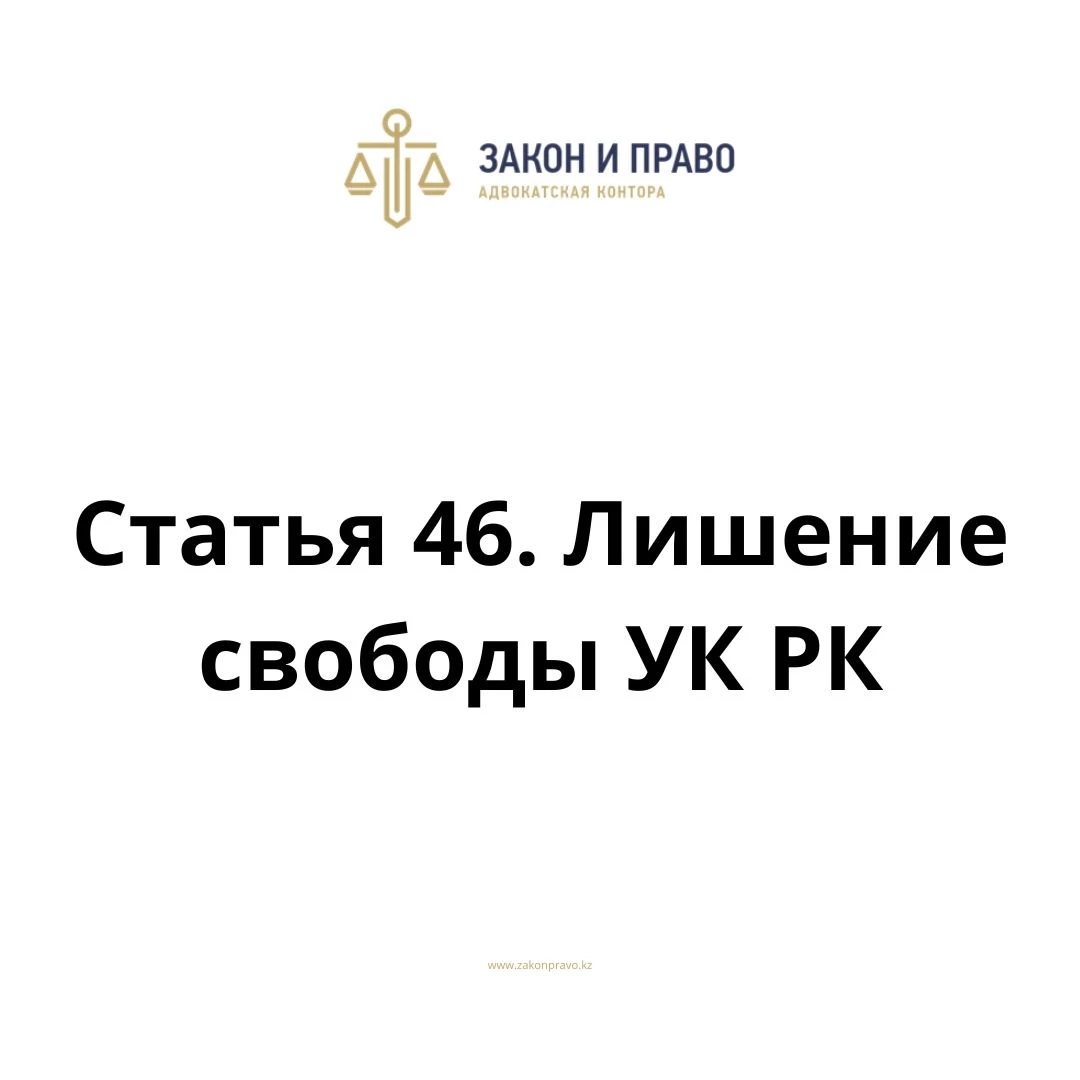Article 46. Deprivation of liberty of the Criminal Code of the Republic of Kazakhstan, the Criminal Code of the Republic of Kazakhstan
1. Deprivation of liberty consists in isolating a convicted person from society by sending him to an institution of the penal system.
2. Persons sentenced to imprisonment who were under eighteen years of age at the time of sentencing shall be placed in institutions of the medium-security penal system for the detention of minors.
3. Imprisonment for the commission of crimes provided for in this Code shall be imposed for a term of six months to fifteen years, and for particularly serious crimes - up to twenty years or for life. For negligent crimes, the term of imprisonment may not exceed ten years. In the case of commutation of a fine, correctional labor, community service, or restriction of liberty by deprivation of liberty, it may be imposed for a period of less than six months. In the case of partial or complete addition of the terms of imprisonment when imposing punishments for a combination of crimes and in the cases provided for in part five of Article 71 and part five of Article 77 of this Code, the maximum term of imprisonment may not exceed twenty-five years, and for a combination of sentences - more than thirty years.
4. Life imprisonment may be imposed for the commission of particularly serious crimes. Life imprisonment is not imposed on persons who have committed a crime under the age of eighteen, women, persons with disabilities of the first or second group, men aged sixty-three and over. Life imprisonment may be commuted by way of pardon to imprisonment for a fixed term.
4-1. If the sanction of the article of the Special Part of this Code does not provide for any other type of punishment other than life imprisonment, then persons who have committed a crime under the age of eighteen shall be sentenced to imprisonment for a term of fifteen to twenty years, and women, persons with disabilities of the first or second group, men aged sixty-three and over years shall be sentenced to imprisonment. freedom for a term of twenty to twenty-five years.
5. The term of imprisonment is assigned:
1) in institutions of the minimum security penal system:
persons convicted of negligent crimes;
persons convicted of crimes not related to the use of violence provided for in Chapters 7, 8, 9, 12 and 13 of this Code;
persons convicted of crimes provided for in Chapter 15 of this Code, in case of full compensation for the damage caused by the crime.;
persons convicted for the first time of committing an intentional crime, for which a sentence of up to two years' imprisonment has been imposed.
The provisions of this paragraph shall not apply to persons sentenced to imprisonment for committing crimes provided for in parts 1-1, two, three and four of Article 366, parts two, three and four of Article 367, part two of Article 368 of this Code.;
2) in institutions of the medium-security penal system:
persons sentenced to imprisonment for a term exceeding two years for committing intentional crimes who have not previously served a prison sentence;
persons sentenced to imprisonment for committing crimes provided for in Parts 1-1, two, three and four of Article 366, parts two, three and four of Article 367, part two of Article 368 of this Code, who have not previously served a custodial sentence;
persons who have not previously served a term of imprisonment, who have been fined, subjected to correctional labor, community service, or restriction of liberty replaced with imprisonment.;
3) in institutions of the maximum security penal system:
persons sentenced to imprisonment who previously served a prison sentence for committing an intentional crime;
persons sentenced to imprisonment for the commission of crimes provided for in parts 1-1, two, three and four of Article 366, parts two, three and four of Article 367, part two of Article 368 of this Code, who previously served imprisonment;
persons who have previously served a prison sentence, who have been fined, subjected to correctional labor, community service, and restriction of liberty replaced with imprisonment.;
4) persons sentenced to life imprisonment in institutions of the penitentiary system of emergency security.
In the case of a combination of sentences for serving imprisonment, the stricter type of institution established by one of the sentences included in the aggregate is determined, taking into account the specifics of this part.
6. Persons sentenced to imprisonment for a term of more than five years for committing particularly serious crimes, with a dangerous recidivism of crimes, who previously served imprisonment, except for persons sentenced to life imprisonment, may be assigned to serve part of the sentence, but not more than five years in institutions of the penitentiary system of complete security.
7. The type of institution appointed by the verdict is changed by the court in accordance with article 96 of the Criminal Executive Code of the Republic of Kazakhstan.
President
Republic of Kazakhstan
© 2012. RSE na PHB "Institute of Legislation and Legal Information of the Republic of Kazakhstan" of the Ministry of Justice of the Republic of Kazakhstan
Constitution Law Code Standard Decree Order Decision Resolution Lawyer Almaty Lawyer Legal service Legal advice Civil Criminal Administrative cases Disputes Defense Arbitration Law Company Kazakhstan Law Firm Court Cases


